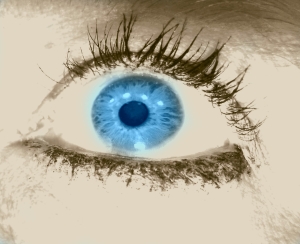I’m guessing many of you have been around the block in the self-help world. We self-help junkies can be easily identified. We are the “sensitive” ones, the hippies, healers, light-workers, and spiritual seekers (or any combination therein) with years of personal growth work under our belt. We’re into inner reflection, meditation, spiritual awakenings, and have extensive knowledge about the micro-nutrients of kale (organic, of course!), goji berries, maca, cacao (otherwise known as chocolate to the unsophisticated), and, of course, red wine. We know all about taking responsibility for our own feelings and may have embraced the notion that we create our own reality. Maybe we’ve even “manifested” something we thought we wanted — oh joy! We know all about our destructive patterns and limiting beliefs. We definitely do yoga, maybe even with goats. (Well, most of us do yoga. I’m a yoga rebel. Although I do enjoy a good corpse pose now and again.) We’ve read all the books, been to all the seminars, know all the theories, cleared our chakras and meridians, received gong baths, aromatherapy, reiki, and other energy therapies we can’t pronounce or remember, let alone understand. We may even pretend to be therapists ourselves. And, most of us are profoundly bored with our own story and our own suffering.
As I’ve journeyed on the self-help path, I’ve found along the way a lot of potential for confusion. It’s easy to get lost in the weeds due to the many contradictions, lack of clarity, and incomplete information prevalent in the personal growth and new-age spiritual arena. As our (*cough*) beloved President would say, “There’s fake news everywhere!” It’s also very easy to fall into what I lovingly refer to as “the self-help trap.”
The self-help trap has many layers. I’m going to discuss just one aspect here, but in general and as an overview, the self-help trap is a trap of self blame and lack of self acceptance. This shame and lack of self acceptance is already present in us, but it is amplified by some of the confusing aspects of self-help teachings. It is a blaming of ourselves for our own suffering and results from a confusion between the notion of responsibility and choice. It arises when we mistakenly believe we have choice when we do not. The self-help trap is subtle because this particular flavor of self blame often feels justifiable and necessary for any sort of growth or change for the better to occur in our lives.
Last week I wrote about a time recently when I went extra crazy. I described how rage had consumed me, that I had expressed it in a hurtful way, and how that rage had then turned inward, transmuted into extreme shame and self-hate. Part of the shame (self blame) came from a belief that “good people” don’t feel such rage, let alone express it, and the fact that I felt and expressed it meant I was an all around bad person. After all, shouldn’t these destructive patterns and feelings be gone by now after all this personal and spiritual growth work?
Anyone who has been in the personal growth world long enough has been inundated with the idea that the only place we have true choice is in how we respond to what is happening in our lives. We come to learn that our reactions are our responsibility and that outer circumstances are not the cause of our inner experiences. We can see this truth easily enough when we notice that two different people often react and respond to the same circumstances in drastically different ways. This realization of responsibility is critical in moving from a place of victim consciousness to a place of empowerment.
The problem is not that this principle of responsibility is wrong or bad. The problem is where we take it next:
-
- We conclude that the next step toward being a happier, more fulfilled human being must be to create shiny, new, loving belief systems so that over time our destructive patterns will no longer arise. Indeed, this is what countless self-help programs are all about.
- We confuse responsibility with both blame and choice.
When a pattern that we are very well aware of gets triggered, and none of the personal growth work we’ve done related to #1 above has changed the fact that it is arising (yet again), this is the moment when it is very easy to fall into the self-help trap. Oftentimes these patterns are made up of old belief systems and autonomic survival reactions which we know at a logical level are not relevant or helpful in the current situation. So, part of what can happen is that since we are now consciously aware of the pattern, know logically that it doesn’t “make sense” in the current situation, and know we are solely responsible for it, we conclude (often unconsciously) that we are therefore to blame for its arising. After all, if we are responsible for our reactions, then why wouldn’t we blame ourselves? There’s no one else to blame!
In addition, we can also believe that because we are responsible, this means we suddenly have conscious choice as to whether or not these patterns arise. More specifically, we believe after a pattern has arisen that we should have been able to stop it, or that it shouldn’t have arisen in the first place because we “know better by now” or because we’ve done affirmation or other work to create new belief systems. After all, we are consciously aware of the pattern, and with awareness comes choice, right? Indeed, this is exactly what we are told over and over again. It is repeatedly pounded into us that the only place where we have true choice is in how we respond to what is happening in our lives, and that that choice somehow magically appears due to conscious awareness of our responses and patterns.
Can you see the walls of the self-help trap now? The truth is that we do not have a conscious choice as to whether or not an automatic pattern will be triggered (although we can certainly do our best to control our outer circumstances in ways that allow us to avoid situations we know trigger us in order to give ourselves the illusion of control). In the end, the triggering process is automatic, which means by definition it is not under our conscious control. And certainly once a pattern is triggered, we no longer have a choice in the matter. It is done. The beliefs, thoughts, sensations, and feelings associated with that pattern will inevitably arise. But what happens for many of us is that, due to a misunderstanding of what responsibility actually means, we believe we had choice in these situations when we did not. The inevitable result is self blame, frustration, and shame. We blame ourselves for allowing the pattern to be triggered, or for not being good enough at this self-help stuff to be able to make it so the pattern doesn’t arise at all. This self blame increases our suffering tenfold by adding an additional helping self loathing to the mix.
It gets worse when the pattern then propels us into some kind of action that is destructive or hurtful to others. If, for whatever reason, we are taken over by the intensity of the experience in such as way that we experience what is arising as all that we are — as our very identity — then we do not really have much of a choice in how we behave either. This was my experience when I went extra crazy recently. In order to have choice in our behavior, some sort of witnessing consciousness — that is, the ability to differentiate our thoughts and feelings from who we think we are — has to be online and engaged as a mediating factor. Sometimes we simply do not have this capacity because our system is overwhelmed, and therefore we run on automatic pilot, acting out unconsciously what we’ve learned to do in similar situations in the past. Then, later, when things have settled and we are no longer triggered, we often look back at how we behaved and think we could have and should have done something differently when, in fact, given our state at the time, we did not have a choice in how we behaved. The shame and self-hate that can arise here is devastating. Not only is it prevalent in the self-help world to think we should always be able to control our behavior, it is also prevalent outside the self-help world. This is not to say we aren’t responsible for our behavior. We are. But there is a difference between responsibility and choice, which is my entire point here.
Perhaps you can see by now the main confusion is that, on a very subtle level, we think we have choice when we actually do not. We end up berating ourselves because we believe that since we have realized we are responsible for our reactions and behavior, this means we suddenly have the capacity and ability to consciously choose our reactions and behaviors from that point forward. And that is utter nonsense. We have to get out of the cycle of shaming ourselves for something that was never in our control in the first place. This is the only way out of the self-help trap and into true healing.
The good news is that we do have choice, just not in the way we may have thought or been told. In general, the patterns programmed into our nervous system are complex survival strategies which worked in the past to get us through situations that our system interpreted as life threatening. When our strategies work (i.e, we survive), our system remembers (programs) these strategies into our nervous system and will automatically (without conscious thought) respond similarly when it perceives threat again in the future. It also changes what we perceive as threatening, as our system now becomes biased to perceive more situations as threatening as a protective mechanism. As a child, we rely heavily on our caregivers for our survival and to help us regulate our distress. Situations that feel life threatening can be not only the obvious traumas such as abuse and neglect, but we can even perceive life threat if a caregiver is not there to help us regulate when we are in extreme emotional distress.
The strategies that are programmed into our nervous system include belief systems, but they also include powerful physiological, emotional, and behavioral responses. The self-help world tends to focus solely on belief systems, giving us a false sense that we can consciously choose and control our responses by simply changing what we believe cognitively. Another approach is to help us create new belief systems, through processes such as affirmations, which are meant to gradually replace the old “outdated” belief systems. (By the way, these new belief systems often include spiritual beliefs, which is where the new age spiritual world integrates with the self-help world.) Even when these methods include bringing in emotional feeling and physiological conviction to better integrate the new belief system at an autonomic level, this does nothing at all to change what our system perceives as threatening! If we have experienced trauma, very small triggers can be perceived by our system as survival threats, even when we can see and understand cognitively that we are safe. We will therefore still be triggered into our automatic survival reactions when our system perceives threat, and this is beyond our conscious control. And remember, many seemingly innocuous social situations can be perceived as life threatening due to our experiences as a child or due to other traumatic experiences as an adult.
So how do we work with this? Where do we actually have choice? The only way to shift our autonomic survival reactions is to change what we perceive — at an autonomic level — as a threat to our survival. When we are triggered, our system is “remembering” a past threat as if it is happening now (which is the same as saying our system is biased toward seeing threat). Often this is the case because the past experience was so overwhelming that it was never fully integrated and processed. The way to integrate these past experiences and rewire the nervous system is to work to build our capacity to be fully present in the here and now when we are triggered.
Being present means having witness consciousness online and being able to differentiate what is arising (thoughts, feelings, sensations, emotions) from “us,” from who we think we are. This allows us to recognize and realize on a deeply physiological level — in our bodies — that we are actually safe right now. When we are able to do this, our innate healing capacity kicks in and our nervous system integrates the past experience and actually rewires our nervous system.
The capacity to be present and inhabit witness consciousness — to differentiate the intensity of what we are experiencing from “us” — can actually be quite challenging due to the overwhelming nature of what arises when we are triggered. We need support, and we need to build internal resources to be able to do this. It takes time and practice to learn to be with our experiences in the way I’m describing, but it is possible. There is no quick fix. This is where we have choice.
If we can let go of continually shaming and blaming ourselves for not being able to control our automatic patterns and responses, then we are freed to be with them and meet them in a new way, with acceptance and curiosity. Compassionate presence with ourselves is what allows for true healing, and the ability to differentiate our experiences from “us” is what gives us the ability to choose our behavior when triggered. In the process, we also build our capacity to shift our attention to the aspect of us that is not suffering, the part that is never affected by our conditioned responses and patterns, the part of us that is more who we truly are on an essential level. As we gain access to our true nature, it becomes our strongest and most powerful resource. We begin to embody more and more fully the creative, joyful, loving, vibrant part of ourselves that we all know is at the heart of who we are.
In the end, this is where the self-help and new age spiritual world is trying to bring us. Despite its confusions and inconsistencies, I am endlessly grateful to be on the path. I’ll be forever proud to proclaim myself a self-help junkie. ❤








 When you are in crisis, the very idea that a gift lies within the experience can seem absurd or even offensive. What is the gift in receiving a life-threatening or debilitating diagnosis? How can there be a gift within being suicidally depressed or the experience of uncontrollable panic attacks? When you are the one in crisis, I have personally found that to be the most difficult time to see the gift. Of course, it is much easier to see the gift as an outsider. In fact, you will no doubt have at least a few people trying to comfort you with age-old clichés such as, “Well, you’re learning something, aren’t you?” or “Every cloud has a silver lining,” or “Don’t forget, everything happens for a reason.” In the midst of a healing crisis, not only can these tired clichés utterly fail to comfort us, often they enrage us because we feel completely unseen in the immensity of our pain by those whose profess to love us.
When you are in crisis, the very idea that a gift lies within the experience can seem absurd or even offensive. What is the gift in receiving a life-threatening or debilitating diagnosis? How can there be a gift within being suicidally depressed or the experience of uncontrollable panic attacks? When you are the one in crisis, I have personally found that to be the most difficult time to see the gift. Of course, it is much easier to see the gift as an outsider. In fact, you will no doubt have at least a few people trying to comfort you with age-old clichés such as, “Well, you’re learning something, aren’t you?” or “Every cloud has a silver lining,” or “Don’t forget, everything happens for a reason.” In the midst of a healing crisis, not only can these tired clichés utterly fail to comfort us, often they enrage us because we feel completely unseen in the immensity of our pain by those whose profess to love us.


